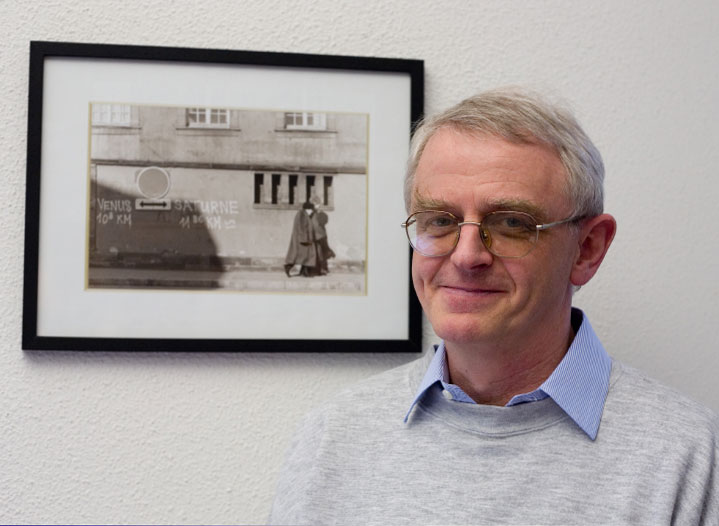
It began in 1969 when he entered Queen’s College Cambridge as an entrance scholar in Chemistry, switching to the Genetics Department where he completed a PhD in 1975 in Drosophila developmental cytogenetics under Michael Ashburner.
He moved to Strasbourg in 1980 to join Pierre Chambon’s laboratory and apply molecular techniques to studies of hormonal regulation of Drosophila development. He used P element transformation extensively for in vivo studies of gene regulation and micro RT-PCR techniques to study multiple transcripts in individual staged/treated Drosophila tissues.
For 20 years, Geoff was a senior Research Director of the French CNRS and prior to joining HFSP in 2004, spent a decade in the dual role of both group leader at the IGBMC and its Executive Secretary with responsibility for national and international, academic and industrial research contracts including intellectual property issues.
Geoff came to HFSPO as a distinguished researcher and experienced administrator, after the first reforms to the HFSP scientific programs had taken place between 2000-2004, i.e. after the neuroscience and molecular biology programs had been combined into one and after a new program, the Young Investigator program, had been established to attract early career talent. He worked enthusiastically with then Secretary-General, Torsten Wiesel, to implement these initiatives in the firm belief that a strong supple program run by scientists for scientists could achieve great things.
Geoff brought acuity, curiosity and creativity to his task of supporting frontier research into the complex systems of living systems. Successive Secretary-Generals have benefitted from his attributes, Ernst-Ludwig Winnacker and currently, Warwick Anderson.
A profound sense of collegiality and service marked Geoff’s approach. In seeking out experts for review committee panels, he sought excellence and breadth of expertise but also those willing to listen and learn in order to take daring decisions together. He took great satisfaction in hearing from review committee members that they had so enjoyed the experience that they hoped they would be invited back another year.
Geoff interacted with awardees in a similar manner, providing helpful, pragmatic advice, with the intuitive empathy of someone who knows exactly where the question is coming from, because he has been there himself. It is no secret that during his years as a researcher he had helped many colleagues fine tune their applications to HFSP!
Geoff gave equal care to providing constructive feedback to unsuccessful applicants. Some responded that though they had not received a grant, it had been a positive experience nevertheless, that they had learned a lot. With his feedback, a good number were successful on a second attempt.
Geoff was particularly mindful of the debt of gratitude owed to Japan whose generosity to the Program has been constant through years, full and fallow. He went on a number of lecture tours to Japan to encourage applicants from Japanese universities and institutes, describing in detail the pitfalls to be avoided in applying for an HFSP grant. He did so despite the fact that he didn’t really enjoy travelling in later years. Hideki Mizuma, then Deputy Secretary-General, made up for it by being an excellent host and travelling companion, taking the strain of organising the trip and, at the right moment, providing a beer. It was also 'en route' to Japan that Geoff had the ‘lightbulb’ moment that led to the Board’s decision to honour Mr Nakasone with the establishment of the HFSP Nakasone Award for ground-breaking research. Geoff was going to hear Mr Nakasone speak at the 20th anniversary event in Tokyo and, in the bus on the way to the airport, conceived the idea of the HFSP Nakasone Award as a fitting tribute to the former Prime Minister whose vision had initiated the Program.
Another defining moment involved Jitu Mayor, a Grant awardee at the National Centre for Biological Sciences, Bangalore, which led to exchanges with Vijay Raghavan and provided the momentum for discussion within India of membership of HFSPO. The Board welcomed India as a Member of the Program in 2008.
Geoff was at home in the office, where he worked closely with Armelle and Carole, forming a dedicated, rigorous, good humoured team, and with his colleagues, the scientific directors, with whom he never tired of ‘talking science’. This began when Martin Reddington was his nearest office neighbour and continues today with Guntram, Barbara and most recently Almut. When he wasn’t talking science, he was talking cricket, in which he took a keen interest since his early days.
Geoff is now retiring and we will miss him sorely. He has shaped the Research Grant program over the years and it owes its present reputation to his careful management of the review cycle on which success critically depends. He leaves however, in the sure knowledge that the grant program is in good hands with Almut Kelber, who in her own words, could not have had a more ‘wise or gentle mentor’.
In a poem dedicated to Geoff, Jill Husser perfectly captures the many highlights of Geoff's career:
There once was a school boy from Wales
Whose intelligence tipped the scales
He also played cricket
Which was just the ticket
For a bright young Winchester male.
There was a young man in a lab
Who found that genetics was fab.
The years went by
With the drosophila fly
That flew him one day to France.
There was a senior professor
Who felt life could be even better
At HFSP
Where he followed the flea
On the frontiers of excellent life science.
There was a Research Grant Director
Committee composer and mentor
Whose lightness of touch
That no-one noticed much
Convinced Kiwis to work even harder - as Chair.
What more can I say ?
But come and see us some day
You’re still one of us
And the chair up the stair
Is yours.
Enjoy your retirement, Geoff !


































